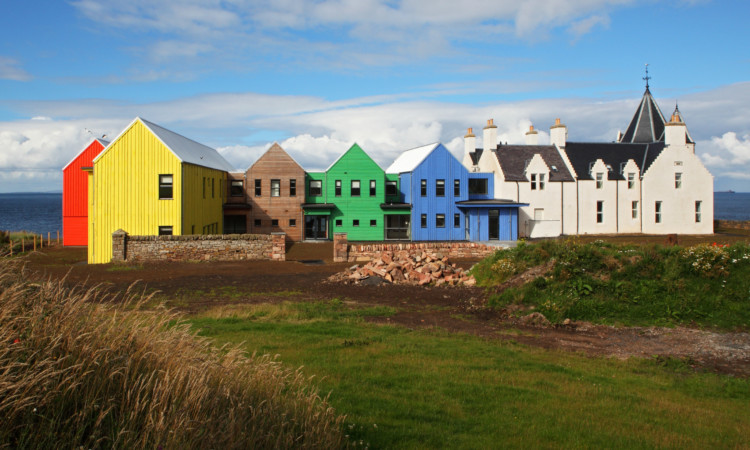
A perfect ending at colourful new John O’Groats.
It is probably the most well-known village in Scotland, but until recently you were never likely to visit it twice.
John O’Groats is synonymous with ‘end-to-enders’ making the epic journey between the top of Scotland and Land’s End at the most southerly tip of England.
But the long-standing sense of disappointment of those arriving in John O’Groats was probably best summed up when the village won the infamous Carbuncle Award in 2010 for the most dismal place in Scotland.
One judge went as far as to describe it as the “most anti-climactic tourist attraction I know”.
Fast-forward four years and things are very much on the up for a village of 300 people that welcomes more than 200,000 visitors every year. Dominating the village’s skyline is the dramatic colour of The Inn.
Left empty since the 1990s, this derelict 19th Century hotel has been transformed by coastal and countryside travel specialists Natural Retreats into an uber cool holiday apartment complex.
The building sits right on the sea, combining the old hotel and a Scandinavian-style wooden extension and is an impressive sight as you come over the hill and down into the village.
The interior continues the Scandinavian theme (remember John O’Groats is closer to Norway than Edinburgh) with cool colours and beautifully designed furniture.
The Inn has six self-catering apartments, between one and four bedrooms, but oddly it still feels a bit like a hotel.
However, the communal areas, a snug reading room and nautical-themed library, are good places to escape to from the apartments for a bit of peace.
We visited during a mainly pleasant spring, but they had the feel of a place to be if you were stepping in from bleaker weather and wanted to settle down with a good book.
Behind The Inn, scattered on the hill, are a collection of timber-clad self-catering chalets with floor-to-ceiling glass frontages.
The self-catering apartments are a great set-up for a short family break though the neighbouring Storehouse was limited in its supplies so it’s worth stocking up before you arrive.
However, the Storehouse will still feature heavily in any visit to The Inn as its caf boasts friendly staff and a good selection for breakfast and lunch.
A wetter afternoon saw us nestled next to its wood-burning stove watching out over the sea and the regular parade of visitors to the famous signpost.
Weather watching is something of an unofficial Scottish sport and The Inn is ideally located for watching all the different seasons trundle up and down the Pentland Firth between the mainland and Orkney.
One evening ended with a sensational sunset and a wonderful array of orange and red. Much is made of the natural light, loved by artists, in this part of the world.
It’s hard to describe, but I sat by the harbour one night envious of those who had perched here before and watched the spectacle of the Northern Lights.
Rugged natural beauty is Caithness’ big selling point and The Inn was a great base for exploring the area around. There are a number of leisurely walks but most visitor attractions are a drive or a cycle away.
Dunnet Forest is a 10-minute drive away and actually a good bet for a walk when the weather isn’t great due to its tree cover.
The walk includes sculptures and a giant wooden xylophone and when you’re finished up, cross the road to have a stomp about the sand dunes of Dunnet Bay.
Nearby is the Castle of Mey, former holiday home of the late Queen Mother, and close to that is Canisbay Church which includes the tombstone of Jan de Groote, a Dutchman who ran the ferry link to Orkney in the 15th Century and gave his name to John O’Groats.
It is not widely known the actual most northerly point on Great Britain is Dunnet Head, a few miles north west of John O’Groats, and it enjoys great views over to Orkney.
We extended our holiday with a trip to Orkney you can catch a ferry from Gills Bay just five minutes away and the crossing only takes an hour.
This was a smart move, though Kirkwall felt a bit like downtown Manhattan compared to the often deserted John O’Groats.
Orkney was amazing and we felt two nights wasn’t enough but if time is tight it is possible to do day trips from right on your doorstep at The Inn.
Between May and September, John O’Groats Ferries runs a day trip from the village’s tiny harbour that makes sure you get through all the Orkney must-sees such as Skara Brae and Kirkwall.
Another sea-based option is the Natural Explorer boat ride. This takes you along the dramatic coastline around the Stacks of Duncansby and Stroma, but most importantly it is an ideal opportunity to see the area’s stunning wildlife.
Orca and minke whales are the big draw but there are also plenty of grey seals, basking dolphins and one of the largest puffin populations in Europe.
Earlier this month, John O’Groats put the Carbuncle prize horror behind itself when the £7-million overhaul won a regeneration award at the Scottish Design Awards.
Travelling to the far reaches of Scotland is nearly always rewarding but often hard work, especially when tying to find decent accommodation.
The Inn offers the style and comfort of an upmarket city hotel but in a rugged location perfect for those looking to be as far away from urban living as possible.
For more information on The Inn go to naturalretreats.co.uk or call 0843 636 7927. Prices start from £70 per night.

Enjoy the convenience of having The Sunday Post delivered as a digital ePaper straight to your smartphone, tablet or computer.
Subscribe for only £5.49 a month and enjoy all the benefits of the printed paper as a digital replica.
Subscribe